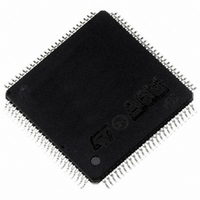TDA7500A STMicroelectronics, TDA7500A Datasheet - Page 33

TDA7500A
Manufacturer Part Number
TDA7500A
Description
IC PROCESSOR AM/FM DGTL 100-TQFP
Manufacturer
STMicroelectronics
Type
Audio Processorr
Datasheet
1.TDA7500ATR.pdf
(40 pages)
Specifications of TDA7500A
Applications
Audio Systems
Mounting Type
Surface Mount
Package / Case
100-TQFP Exposed Pad, 100-eTQFP, 100-HTQFP, 100-VQFP
Lead Free Status / RoHS Status
Lead free / RoHS Compliant
Available stocks
Company
Part Number
Manufacturer
Quantity
Price
Company:
Part Number:
TDA7500ATR
Manufacturer:
STMicroelectronics
Quantity:
10 000
Part Number:
TDA7500ATR
Manufacturer:
ST
Quantity:
20 000
Asynchronous Sample Rate Converter
The ASRC, embedded in the TDA7500A, offers a fully digital stereo asynchronous sample rate conversion of
digital audio sources to the TDA7500A's internal sample frequency. This solves the problem of mixing audio
sources with different sample rates and doesn't need the "classical" approach of synchronizing the PLL.
As the usual internal sample rate of TDA7500A is around 48.51 kHz, the ASRC works with the common input
signals only in upsampling mode. There is no need to explicitly program the input and output sample rates, as
the ASRC solves this problem with an automatic Digital Ratio Locked Loop.
The ASRC is intended for applications up to 20 bit input word width. Digital Audio Sources can be applied in
general Serial Audio Interface format (3 wires) as well as in AES/EBU, IEC and EIAJ CP-340 format (1 wire).
An interface to the DSP core offers the possibility of interrupt controlled sample delivery. Furthermore, a programma-
ble Control/Status Register inside the ASRC allows a great variety of adjustments and status informations.
Figure 18. shows, how the ASRC interfaces the other blocks.
PLL Clock Oscillator
The PLL Clock Oscillator can accept an external clock at XTI or it can be configured to run an internal oscillator
when a crystal is connected across pins XTI & XTO. There is an input divide block IDF (1 -> 32) at the XTI clock
input and a multiply block MF (9 -> 128) in the PLL loop. Hence the PLL can multiply the external input clock by
a ratio MF/IDF to generate the internal clock. This allows the internal clock to be within 1 MHz of any desired
frequency even when XTI is much greater than 1 MHz. It is recommended that the input clock is not divided
down to less than 1 MHz as this reduces the Phase Detector's update rate.
The clocks to the DSP can be selected to be either the VCO output divided by 2 to 16, or be driven by the
XTI pin directly.
The crystal oscillator and the PLL will be gated off when entering the power-down mode (by setting a reg-
ister on DSP0).
Figure 18. System Overview
Master Clock
Source
Fsout * 256
Left [19:0]
Right [19:0]
Fsin
lrckr_slv
sckr_slv
sdi0
48 kHz 48 kHz 44.1 kHz 44.1 kHz
DAT
SAI Receiver
Channel 0
Asynchr. Sample Rate Converter
DAB
3
Digital Audio Sources e.g.:
CD
ASRC
DSP
MD
S/PDIF
Receiver
Broadcast
32 kHz
1
Left [19:0]
Right [19:0]
Fsin
AES/EBU
IEC 958
EIAJ CP-340
TDA7500A
33/40













